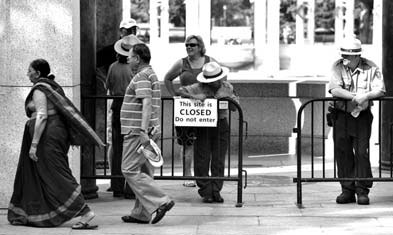Debt ceiling deadline looms over US Congress
As the US government moved into the second week of a shutdown on Monday with no end in sight, a deadlocked US Congress also confronted an Oct 17 deadline to increase the nation's borrowing power or risk default.
The last big confrontation over the debt ceiling, in August 2011, ended with an eleventh-hour agreement under pressure from shaken markets and warnings of an economic catastrophe if a default were allowed to occur.
A similar last-minute resolution remained a distinct possibility this time as well.
In comments on Sunday political talk shows, neither Republicans nor Democrats offered any sign of impending agreement on either the shutdown or the debt ceiling, and both blamed the other side for the impasse.
"I'm willing to sit down and have a conversation with the president," said Republican House of Representatives Speaker John Boehner, speaking on ABC's This Week. But, he added, US President Barack Obama's "refusal to negotiate is putting our country at risk".
On CNN's State of the Union, US Treasury Secretary Jack Lew said: "Congress is playing with fire," adding that Obama will not negotiate until "Congress does its job" by reopening the government and raising the debt ceiling.
The shutdown has pushed hundreds of thousands of workers off the job, closed national parks and museums and stopped an array of government services.
The one bright spot on Monday is a significant chunk of the furloughed federal workforce is headed back to work. US Defense Secretary Chuck Hagel ordered nearly 350,000 back on the job, basing his decision on a Pentagon interpretation of a law called the Pay Our Military Act.
Issues merged
The two issues started out separately in the House but have been merged by the pressure of time.
Conservative Republicans in the House have resisted funding the government for the current fiscal year until they extract some concession from Obama that would delay or defund his signature healthcare law, which was launched on Oct 1.
Many of those conservatives want a similar condition placed on raising the debt ceiling, but in his list of debt-ceiling demands on Sunday, Boehner did not mention the Affordable Care Act, commonly known as Obamacare.
"It's time to talk about the spending problem," said Boehner, including measures to rein in costs of entitlement programs such as the Social Security retirement system and Medicare, the government-run health insurance plan for seniors.
Harry Reid, leader of the Democratic-led Senate, is expected to decide soon on whether to try to open formal debate on a "clean" bill - without extraneous issues attached - to raise the US Treasury's borrowing authority.
Passage of such a measure would require at least six of the Senate's 46 Republicans to join its 54 Democrats in order to overcome procedural hurdles that opponents of Obamacare could erect.
According to one Senate Democratic aide, the debt limit hike might be coupled with a new initiative to reform the US tax code and achieve long-term savings in Social Security and Medicare, whose expense has soared along with the population of retirees.
Republican lawmakers have floated other ideas, such as a very short debt limit increase, which would create time for more negotiation at the expense of further market uncertainty, and repeal of a medical device tax.
The tax is expected to generate some $30 billion over 10 years to help pay for healthcare insurance subsidies under Obamacare.
Some Democrats favor repealing the tax, but they insist that replacement revenues be found and repeal be considered only after government reopens and the debt limit is raised.
Reuters-AP
|
Tourists walk past US Park Service rangers manning a barrier at the World War II Memorial in Washington, as the partial government shutdown entered day six on Sunday. Mike Theiler / Reuters |
(China Daily 10/08/2013 page11)









